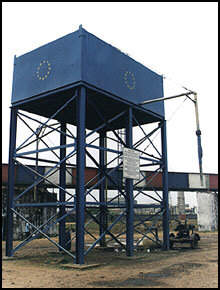 WATER AND SANITATION WATER AND SANITATION |
The Liberia Water and Sewer Corporation (LWSC) is another state-owned enterprise, which the government has announced it intends to privatize to ensure efficiency in the supply of safe drinking water to Monrovia's nearly one million inhabitants.
The LWSC has is major source of water supply at White Plains, just outside Monrovia, where the water for residents of the nation's capital is treated and later pumped into steel pipes that feed the homes and offices scattered around the town.
Today, only one-fourth of the capital is served pipe-borne water due to a breakdown in the corporation's main 36-inch pipeline that conveys the treated water from the White Plains plant to central Monrovia and its suburbs. The absence of a hydraulic lift pump to send the water to greater Monrovia is another hindrance to residents enjoying the pleasure of turning their taps for water to flow.
Monrovia's daily needs for pipe-borne water is put at 15 million gallons a day.

| At the moment, the city is served water from high-rise reservoirs built at strategic points around the city by the European Union that has been financing the provision of safe water for the bulk of the people.
Also, commercial water trucking has become a new line of business serving embassies, offices, hotels, beverage bottling factories and some private homes that have reservoirs that funnel the water into their taps.
The corporation also has its rural water supply component that basically deals with the supply of treated water from water towers pitched at high-rise points of provincial capitals to supply the communities. There are about a dozen of such facilities across the country.
The LWSC sewerage treatment plant in Monrovia's suburb is near obsolete, as is its fertilizer production component, both set up some 40 years ago. The corporation desires to privatize these facilities for maximum productivity and efficient service to the people. |

